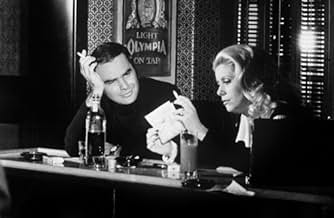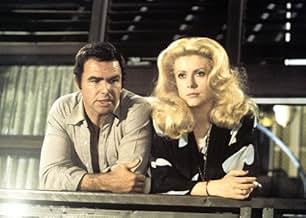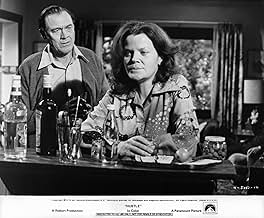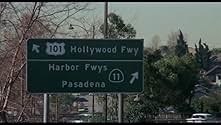IMDb RATING
6.2/10
3.1K
YOUR RATING
At the instigation of a grieving father, a Los Angeles cop investigates the suspicious circumstances of a girl's apparent suicide.At the instigation of a grieving father, a Los Angeles cop investigates the suspicious circumstances of a girl's apparent suicide.At the instigation of a grieving father, a Los Angeles cop investigates the suspicious circumstances of a girl's apparent suicide.
Colleen Brennan
- Gloria Hollinger
- (as Sharon Kelly)
Featured reviews
Having collaborated on "The Longest Yard", director Robert Aldrich cast Burt Reynolds and Eddie Albert again in the enigmatic "Hustle". Reynolds plays LA cop Phil Gaines. He and his wife have basically no relationship, so Phil lives with call girl Nicole Britton (Catherine Deneuve). When a young woman gets found dead on the beach one day, Phil and his colleague Louis Belgrave (Paul Winfield) get hired to investigate. They conclude that she died of a self-induced drug overdose. But they don't tell her parents (Ben Johnson and Eileen Brennan) that there were massive amounts of semen in all three orifices of the woman's body, and that the woman was a stripper in a nightclub. The father is convinced that this was not a suicide, and is determined to investigate on his own if necessary.
I have to say that the movie has a rather convoluted plot: the number of characters - and the question of each character's relationship to each other - makes the whole thing hard to follow at times. As it is, following the revelation of the body at the beginning, the movie sort of throws Phil into the story from right out of the blue. It seems that mostly, the movie functions as a look at the underbelly of 1970s LA, including a hostage situation in one scene. And, if all else fails, there's always something sexy for Catherine Deneuve to do (namely the part about what Switzerland has). A surprise appearance - although they do credit him - is Ernest Borgnine as Phil and Louis's superior; he's the only character who seems as if he's about to have a seizure or something.
Overall, I think that the movie is seeing, if only once. While it is true that the movie progresses pretty slowly, I actually would assert that that adds some realism: not every detective/action story has to be a series of explosions and mayhem.
All in all, a worthwhile movie. BTW, did you notice who the hold up man at the end is? It's Freddy Krueger himself, Robert Englund. And I wonder if David Spielberg is related to Steven Spielberg.
Sammy Davis Jr. hugging Nixon...
I have to say that the movie has a rather convoluted plot: the number of characters - and the question of each character's relationship to each other - makes the whole thing hard to follow at times. As it is, following the revelation of the body at the beginning, the movie sort of throws Phil into the story from right out of the blue. It seems that mostly, the movie functions as a look at the underbelly of 1970s LA, including a hostage situation in one scene. And, if all else fails, there's always something sexy for Catherine Deneuve to do (namely the part about what Switzerland has). A surprise appearance - although they do credit him - is Ernest Borgnine as Phil and Louis's superior; he's the only character who seems as if he's about to have a seizure or something.
Overall, I think that the movie is seeing, if only once. While it is true that the movie progresses pretty slowly, I actually would assert that that adds some realism: not every detective/action story has to be a series of explosions and mayhem.
All in all, a worthwhile movie. BTW, did you notice who the hold up man at the end is? It's Freddy Krueger himself, Robert Englund. And I wonder if David Spielberg is related to Steven Spielberg.
Sammy Davis Jr. hugging Nixon...
Burt Reynolds plays Phil Gaines, a middle-aged California cop plagued by a midlife crisis. His wife is seeing someone else, and he's in love with Nicole (lovely Catherine Deneuve), a prostitute. His job as cop entails endless frustrations not only with criminals but also with victim relatives, two of whom are Marty Hollinger (Ben Johnson) and Marty's wife Paula (Eileen Brennan), whose daughter was found dead on the beach. And the case is Phil's to investigate.
Some viewers will object to the film's admittedly slow pace. And the film does have a problem, but I don't think it's the pace. I think the problem here is that the script doesn't give us enough reason to care about Phil Gaines and his life as a cop. That he dates a prostitute does not help. There's also insufficient back-story about him. Except for his love life, we really don't get to know him very well, certainly not well enough to foreshadow the film's implausible double climax.
Perhaps the script's biggest flaw, however, is its lack of focus. Too much screen time is given to the Marty Hollinger character and his silly efforts to solve the case of his daughter's death, on his own. Whose story is this: Phil Gaines' or Marty Hollinger's?
But "Hustle" is not a bad movie, really it isn't. The casting and acting are fine. I thought Eileen Brennan especially gave a memorable performance. The film's production design is good. And color cinematography is terrific. I really liked those outdoor scenes on the deck where Phil and Nicole chat about life and love, with "Yesterday When I Was Young" playing in the background. Such scenes convey a melancholy, nostalgic mood, consistent with Phil's midlife crisis.
Although the screenplay is flawed, "Hustle" is still worth watching at least once, for the underlying character study of a cop in midlife crisis, for the fine acting, and for the film's excellent cinematography and production values.
Some viewers will object to the film's admittedly slow pace. And the film does have a problem, but I don't think it's the pace. I think the problem here is that the script doesn't give us enough reason to care about Phil Gaines and his life as a cop. That he dates a prostitute does not help. There's also insufficient back-story about him. Except for his love life, we really don't get to know him very well, certainly not well enough to foreshadow the film's implausible double climax.
Perhaps the script's biggest flaw, however, is its lack of focus. Too much screen time is given to the Marty Hollinger character and his silly efforts to solve the case of his daughter's death, on his own. Whose story is this: Phil Gaines' or Marty Hollinger's?
But "Hustle" is not a bad movie, really it isn't. The casting and acting are fine. I thought Eileen Brennan especially gave a memorable performance. The film's production design is good. And color cinematography is terrific. I really liked those outdoor scenes on the deck where Phil and Nicole chat about life and love, with "Yesterday When I Was Young" playing in the background. Such scenes convey a melancholy, nostalgic mood, consistent with Phil's midlife crisis.
Although the screenplay is flawed, "Hustle" is still worth watching at least once, for the underlying character study of a cop in midlife crisis, for the fine acting, and for the film's excellent cinematography and production values.
Alternate and original title (all comments from 28 year old memory) City of Angels. I saw this movie while on 3-4 hour break from college classes in lower Manhattan. Burt plays Burt. His character is a little too worldly to be believable, yet I love this picture. Deneuve is hot and Burt daydreams about retiring to Italy with her where they can open a liquor store. Burt keeps saying "Bingo" every few minutes. He had to be cheating. Seriously, the film is serious product placement for Bushmill's Irish Whiskey. After watching the flick I went out and got bombed on the stuff. Wound up Millstoned for 28 years. Recently got released. Has Burt made a good movie since I was in?
'Hustle' is an overlooked film, though it is easy to see why.
Stylistically it is very low-key with no notable flourishes or tricksiness. It boasts little in the way of 'action'. A hostage situation sequence seems to have been added purely to provide something in that line for fidgety Burt fans. It is profoundly cynical and resolutely (almost excessively) downbeat. But it is also very thoughtful, atmospheric, well acted and absorbing. A kind of modern dress companion piece to 'Chinatown'. And whilst not quite achieving the force and subtlety of that film, it remains highly creditable.
Reynolds is effective as the world weary cop in love with a French prostitute, a cipher whom Deneuve turns into a real person. Her character represents some sort of unattainable, glamorous continental dream to the policeman. This idea is explored and reinforced by numerous references and allusions to European cinema, culture and locale.
Burt looks uncannily like a youthful Brando and brings great restraint to a role which could have been horribly over-played. Ben Johnson, Eileen Brennan and Paul Winfield also all give good performances as beaten, screwed-up people. The outstanding turn, though, comes from Edward Albert as Leo Sellers, a wealthy and powerful businessman with dubious tastes and connections. This character is key to Steve Shagan's screenplay in the same way that John Huston's Noah Cross was to Robert Towne's 'Chinatown'. A persona symbolic of corruption and degeneracy, but also integral to the prosperity of the society he is such a part of. Sellers is a refined, intelligent man with a keen eye for people's weak spots and fingers deft enough to push all of their buttons at once. Mr. Albert brings him to life with a palpable evil.
'Hustle' is a film that I like to reacquaint myself with from time to time. Whilst Shagan's script is occasionally a tad overblown and too fruity for its own good, there are some great lines and moments. For me, it's noirish exploration of thwarted romanticism is pretty much irresistible.
A minor classic.
Stylistically it is very low-key with no notable flourishes or tricksiness. It boasts little in the way of 'action'. A hostage situation sequence seems to have been added purely to provide something in that line for fidgety Burt fans. It is profoundly cynical and resolutely (almost excessively) downbeat. But it is also very thoughtful, atmospheric, well acted and absorbing. A kind of modern dress companion piece to 'Chinatown'. And whilst not quite achieving the force and subtlety of that film, it remains highly creditable.
Reynolds is effective as the world weary cop in love with a French prostitute, a cipher whom Deneuve turns into a real person. Her character represents some sort of unattainable, glamorous continental dream to the policeman. This idea is explored and reinforced by numerous references and allusions to European cinema, culture and locale.
Burt looks uncannily like a youthful Brando and brings great restraint to a role which could have been horribly over-played. Ben Johnson, Eileen Brennan and Paul Winfield also all give good performances as beaten, screwed-up people. The outstanding turn, though, comes from Edward Albert as Leo Sellers, a wealthy and powerful businessman with dubious tastes and connections. This character is key to Steve Shagan's screenplay in the same way that John Huston's Noah Cross was to Robert Towne's 'Chinatown'. A persona symbolic of corruption and degeneracy, but also integral to the prosperity of the society he is such a part of. Sellers is a refined, intelligent man with a keen eye for people's weak spots and fingers deft enough to push all of their buttons at once. Mr. Albert brings him to life with a palpable evil.
'Hustle' is a film that I like to reacquaint myself with from time to time. Whilst Shagan's script is occasionally a tad overblown and too fruity for its own good, there are some great lines and moments. For me, it's noirish exploration of thwarted romanticism is pretty much irresistible.
A minor classic.
Hustle is directed by Robert Aldrich and written by Steve Shagan. It stars Burt Reynolds, Catherine Deneuve, Ben Johnson, Paul Winfield, Ernest Borgnine, Eddie Albert and Eileen Brennan. Music is by Frank De Vol and cinematography by Joseph Biroc.
A dead girl on the beach, that creates heat.
When the body of a young hooker and drug user is found on the beach, the weary LAPD detectives wrap it all up quickly as a suicide. But the father is having none of it and sets about doing his own investigation. All parties involved with the woman, known or presently unknown, are heading for a collision course.
You are doing it for a nobody.
It's a bleak and seamy L.A. that forms the setting for Aldrich's sadly undervalued neo-noir. A place where the police are often corrupt, turning a blind eye to illegal activities perpetrated by high profile suits, where pimps, pushers and prostitutes thrive. Unfaithful wives, a shoe fetish and rebuilt asses also mark the land! Our central cop is Lt. Gaines (Reynolds), a cynical classic movie buff yearning for the European world of harmony depicted in the movies he so enjoys. He's in a relationship with a French call girl (Deneuve), it's a strained relationship, but there is love there if the two of them could just unshackle their hang-ups and vulnerabilities. And then there's the tortured father of the dead girl (Johnson), an ex-serviceman of the Korean War, he's highly strung, volatile, he carries deep emotional baggage that will become heavier the more he learns about his baby girl's existence.
I'm starting to draw dirty pictures of what you do.
The case of the dead girl is merely a backdrop to the unravelling of the primary characters' make ups. This is very much a character driven piece, a slow burn, complex and cynical picture. All characters mean something, adding much to the near depressing tone that Aldrich, Shagan and Biroc have (rightly) favoured. These characters give the film many layers, rendering all dialogue to be of interest, while ensuring the narrative is not linear. It failed at the box office on release, it's perhaps not hard to see why. On the surface, via plot summary and marketing, the film lovers of 75 thought they were getting a murder mystery-cops and villains-crime story, with Reynolds leading the machismo fight for justice. But this is far better than your run of the mill crime picture, it's dark, brooding, and even allows itself some moments of humour to nestle in nicely with the uneasy nature of the beast. While the finale is pitch perfect noir, it's not apologia, it brings the film to a cruelly ironic close.
Patiently crafted by the brilliant Aldrich, and performed with considerable skill and emotion by the cast, Hustle is top line neo-noir and deserves a more appreciative audience. 9/10
A dead girl on the beach, that creates heat.
When the body of a young hooker and drug user is found on the beach, the weary LAPD detectives wrap it all up quickly as a suicide. But the father is having none of it and sets about doing his own investigation. All parties involved with the woman, known or presently unknown, are heading for a collision course.
You are doing it for a nobody.
It's a bleak and seamy L.A. that forms the setting for Aldrich's sadly undervalued neo-noir. A place where the police are often corrupt, turning a blind eye to illegal activities perpetrated by high profile suits, where pimps, pushers and prostitutes thrive. Unfaithful wives, a shoe fetish and rebuilt asses also mark the land! Our central cop is Lt. Gaines (Reynolds), a cynical classic movie buff yearning for the European world of harmony depicted in the movies he so enjoys. He's in a relationship with a French call girl (Deneuve), it's a strained relationship, but there is love there if the two of them could just unshackle their hang-ups and vulnerabilities. And then there's the tortured father of the dead girl (Johnson), an ex-serviceman of the Korean War, he's highly strung, volatile, he carries deep emotional baggage that will become heavier the more he learns about his baby girl's existence.
I'm starting to draw dirty pictures of what you do.
The case of the dead girl is merely a backdrop to the unravelling of the primary characters' make ups. This is very much a character driven piece, a slow burn, complex and cynical picture. All characters mean something, adding much to the near depressing tone that Aldrich, Shagan and Biroc have (rightly) favoured. These characters give the film many layers, rendering all dialogue to be of interest, while ensuring the narrative is not linear. It failed at the box office on release, it's perhaps not hard to see why. On the surface, via plot summary and marketing, the film lovers of 75 thought they were getting a murder mystery-cops and villains-crime story, with Reynolds leading the machismo fight for justice. But this is far better than your run of the mill crime picture, it's dark, brooding, and even allows itself some moments of humour to nestle in nicely with the uneasy nature of the beast. While the finale is pitch perfect noir, it's not apologia, it brings the film to a cruelly ironic close.
Patiently crafted by the brilliant Aldrich, and performed with considerable skill and emotion by the cast, Hustle is top line neo-noir and deserves a more appreciative audience. 9/10
Did you know
- TriviaRobert Englund: The "A Nightmare on Elm Street" franchise star as "Hold-up Man". This was Englund's third film.
- GoofsRght after Hollinger punches Gaines in the morgue, there's a red welt near Gaines' left eye. In the next shot, the welt is gone.
- Quotes
Lt. Phil Gaines: Don't you know where you live, Marty? Can't you smell the bananas? You know what country you live in? You live in Guatamala with color television.
- ConnectionsFeatured in I love you, je t'aime (1979)
- SoundtracksYesterday when I was Young
(Hier Encore)
Music by Charles Aznavour
French lyrics by Charles Aznavour
English lyrics by Herbert Kretzmer
Sung by Charles Aznavour
Courtesy of Barclay Records
- How long is Hustle?Powered by Alexa
Details
Box office
- Budget
- $3,050,000 (estimated)
- Gross worldwide
- $465,788
Contribute to this page
Suggest an edit or add missing content




































